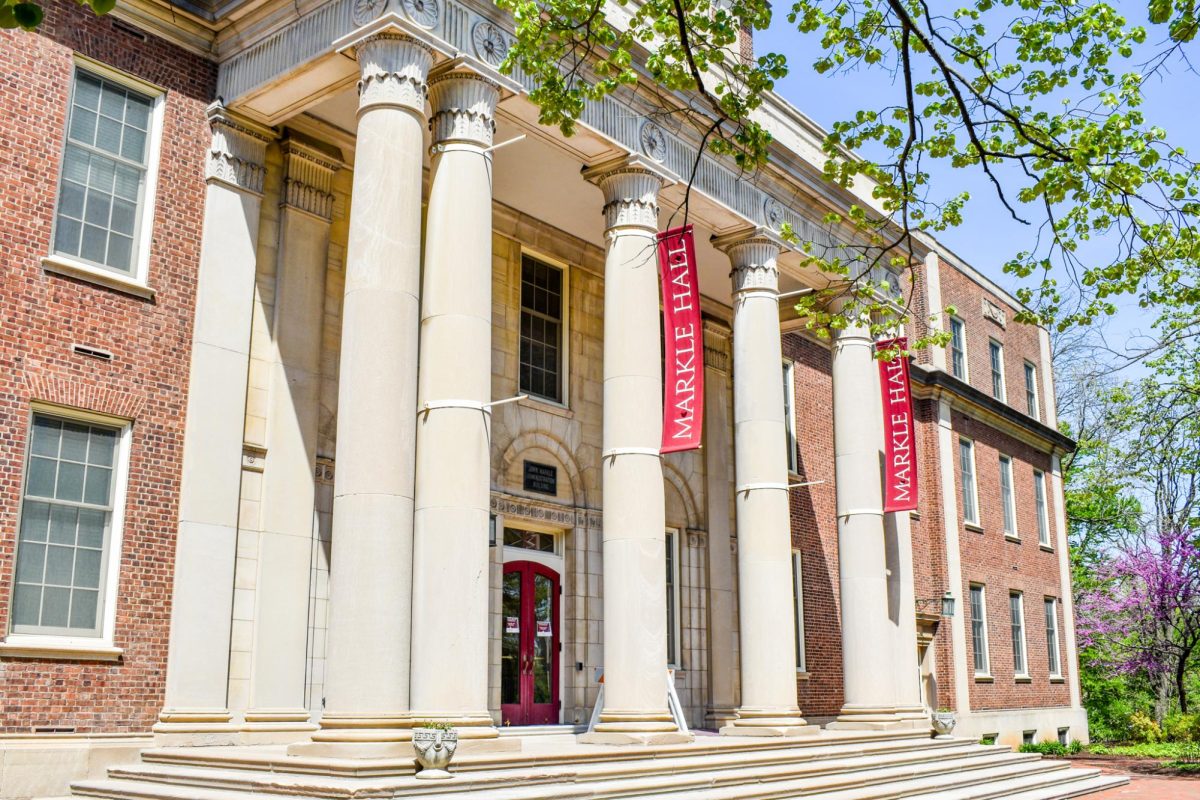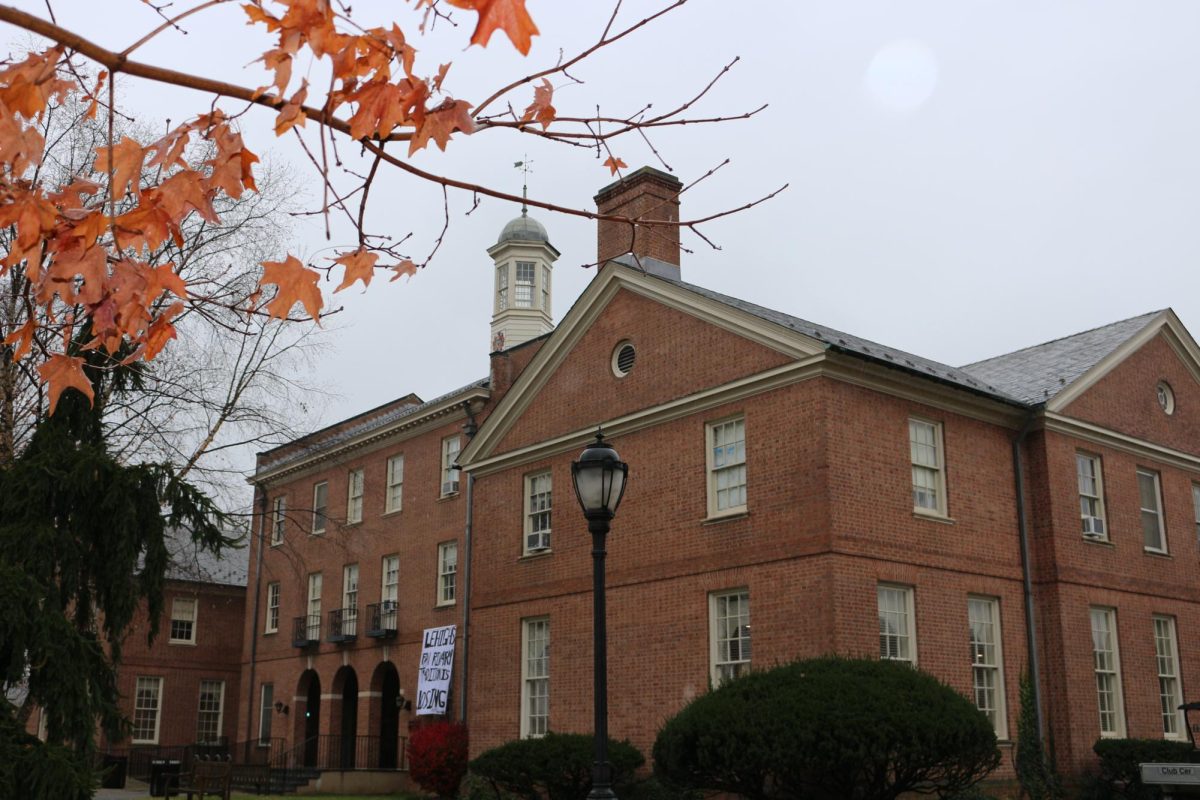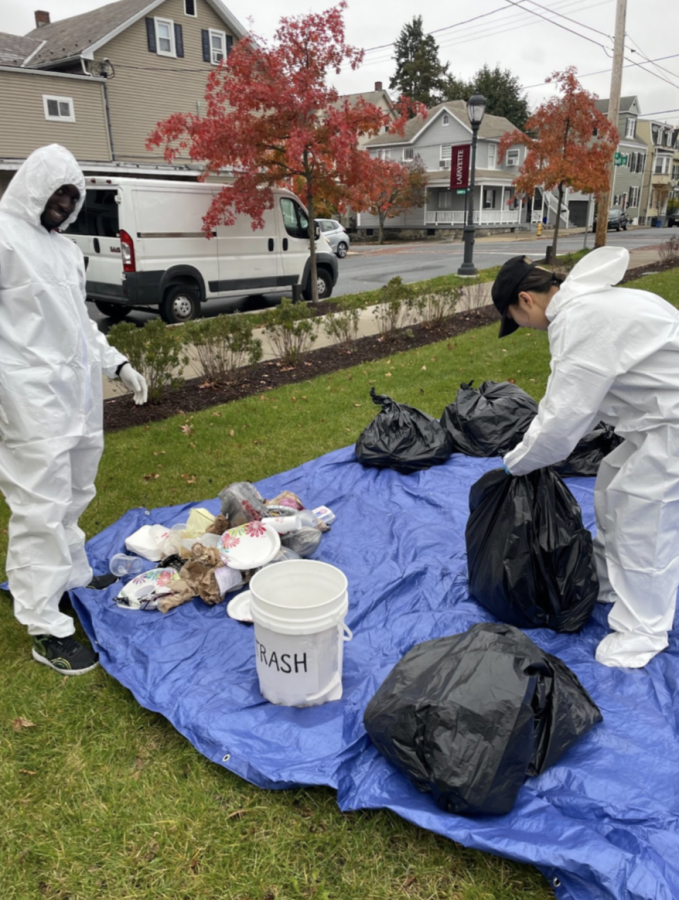In a waste audit of the McCartney residences this past weekend, it was found that while students are throwing the majority of trash items into the correct bins, there is a contamination rate of 48.6 percent in the recycling stream. The results of the audit will guide policy on composting and recycling at the college going forward.
A waste audit is “a formal, structured process used to quantify the amount and types of wastes being generated by a group of people,” according to the official waste audit summary by the Office of Sustainability.
Eco Reps, residential sustainability advisors tasked with leading sustainability initiatives in their designated housing facilities, removed trash and recycling from common spaces in the McCartney residences and weighed the contents. The contents were then sorted into trash and recycling and weighed again. The data from this audit was compiled and analyzed, resulting in recommendations for changes in future waste management practices.
“The reason we wanted to do this waste audit was to better understand the current setup of this type of residence hall and whether they would want to replicate that setup when it comes to waste management in any new building that might arise,” sustainability outreach and engagement manager Samantha Smith said.
The McCartney residences consist of a different waste management system than most dormitories on campus. Typically, campus residences utilize waste closets, while at the McCartneys, students are instructed to bring their waste out to a dumpster. According to the audit, most students bring their trash and recycling to the common spaces of the building. It was for this reason that the audit was of the common spaces instead of the dumpsters.
However, McCartney resident and Eco Rep Selena Luu ‘23 said that students throw items into the dumpsters more often.
“Everybody has their own trash in their suite,” Luu said. “[They] just take the bag down to the dumpsters and throw it away.”
She also said that signage near the dumpsters is unclear, causing students to throw away waste without sorting out recyclables beforehand.
“I just noticed [the recycling lettering on one dumpster] and I’ve lived there for half the semester already,” Luu said.
Director of Operations for the McCartney Residences Kelly Steinmetz also said that students tend to toss their waste in the dumpster.
“I think the majority of our students do take their trash directly out to the dumpster that’s behind the building,” Steinmetz said. “So [the audit] is only capturing a snapshot of students that throw trash away in the community spaces.”
While the accuracy of the sample remains unclear, the results of the audit were synthesized and have already initiated change within the waste management program.
“We found that sixteen percent [of the contamination] was food,” Smith said. “For example, maybe their carton with the sandwich was recyclable, but part of the sandwich was still in there … which causes contamination.”
In addition to findings about contamination in the recycling stream, the audit also found that 43 percent of items thrown in the trash could have been composted.
“I know they were looking at the potential of composting and so that’s one of the things in the report,” Steinmetz said. “It’s the first waste audit that I’ve been a part of, so I wasn’t sure what to expect. I think it’s a good start to see ways that we can encourage more recycling and encourage more sustainable initiatives.”
The diversion rate, which measures the portion of waste not sent to a landfill, was 48.48 percent. According to the report, a composting program could increase the diversion rate for this building by over 10 percent.
“When we think about if composting would work on certain areas of campus, we want to know what composition of our trash is compostable,” Smith said. “And in this case, forty-three percent, that’s a good, high percentage.”
Another potential change inspired by the waste audit is to provide each suite with recycling and trash streams, accompanied by appropriate signage, to encourage the pre-sorting of trash and recycling before students take their items to the dumpsters or common areas.
“In addition to the waste audit process itself, we tend to gather information about the building based on observation of the students and based on feedback from the custodians or facilities,” sustainability director Delicia Nahman said. “How are the students educated about waste and recycling? How often are they educated about it?”
According to Nahman, the results of the audit unearthed a lack of information regarding waste management for students. An additional initiative will involve posting laminated signage in front of the dumpsters to eliminate confusion about recycling availability.
“This data will really help us have more informed decisions moving forward about what recycling looks like and what students are actually doing,” Smith said.
Students can expect to see changes implemented by the Office of Sustainability to address contamination in the recycling stream.
“We’re always happy to participate in whatever initiatives are happening on campus,” Steinmetz said. “I think it’s a good start to see ways that we can encourage more recycling and encourage more sustainable initiatives.”























































































































steven daniels • Nov 13, 2022 at 9:00 am
recycling not a big concern or priority for many. Education and
proper signage for recycle bins would certainly help.